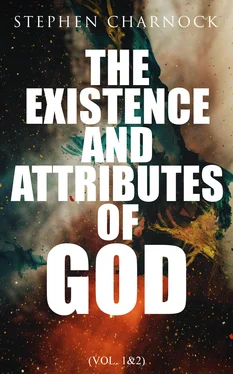Stephen Charnock - The Existence and Attributes of God (Vol. 1&2)
Здесь есть возможность читать онлайн «Stephen Charnock - The Existence and Attributes of God (Vol. 1&2)» — ознакомительный отрывок электронной книги совершенно бесплатно, а после прочтения отрывка купить полную версию. В некоторых случаях можно слушать аудио, скачать через торрент в формате fb2 и присутствует краткое содержание. Жанр: unrecognised, на английском языке. Описание произведения, (предисловие) а так же отзывы посетителей доступны на портале библиотеки ЛибКат.
- Название:The Existence and Attributes of God (Vol. 1&2)
- Автор:
- Жанр:
- Год:неизвестен
- ISBN:нет данных
- Рейтинг книги:3 / 5. Голосов: 1
-
Избранное:Добавить в избранное
- Отзывы:
-
Ваша оценка:
- 60
- 1
- 2
- 3
- 4
- 5
The Existence and Attributes of God (Vol. 1&2): краткое содержание, описание и аннотация
Предлагаем к чтению аннотацию, описание, краткое содержание или предисловие (зависит от того, что написал сам автор книги «The Existence and Attributes of God (Vol. 1&2)»). Если вы не нашли необходимую информацию о книге — напишите в комментариях, мы постараемся отыскать её.
The Existence and Attributes of God (Vol. 1&2) — читать онлайн ознакомительный отрывок
Ниже представлен текст книги, разбитый по страницам. Система сохранения места последней прочитанной страницы, позволяет с удобством читать онлайн бесплатно книгу «The Existence and Attributes of God (Vol. 1&2)», без необходимости каждый раз заново искать на чём Вы остановились. Поставьте закладку, и сможете в любой момент перейти на страницу, на которой закончили чтение.
Интервал:
Закладка:
6. It is against the wisdom of God. God, as a God of order, has put earthly things in subordination to heavenly; and we, by this unworthy carriage, invert this order, and put heavenly things in subordination to earthly; in placing mean and low things in our hearts, and bringing them so placed into God’s presence, which his wisdom at the creation put under our feet. A service without spiritual affections is a “sacrifice of fools” (Eccles. v. 1), which have lost their brains and understandings: a foolish spirit is very unsuitable to an infinitely wise God. Well may God say of such a one, as Achish of David, who seemed mad, “Why have you brought this fellow to play the madman in my presence? Shall this fellow come into my house?” (1 Sam. xxi. 15.)
7. It is against the omnisciency of God. To carry it fair without, and impertinently within, is as though God had not an all‑seeing eye that could pierce into the heart, and understand every motion of the inward faculties; as though God were easily cheated with an outward fawning service, like an apothecary’s box with a gilded title, that may be full of cobwebs within. What is such a carriage, but a design to deceive God, when, with Herod, we pretend to worship Christ, and intend to murder all the motions of Christ in our souls? A heedless spirit, an estrangement of our souls, a giving the reins to them to run out from the presence of God to see every reed shaken with the wind, is to deny him to be the Searcher of hearts, and the Discerner of secret thoughts; as though he could not look through us to the darkness and remoteness of our minds, but were an ignorant God, who might be put off with the worst as well as the best in our flock. If we did really believe there were a God of infinite knowledge, who saw our frames and whether we came dressed with wedding garments suitable to the duties we are about to perform, should we be so garish, and put him off with such trivial stuff, without any reverence of his Majesty?
8. It is against the holiness of God. To alienate our spirits is to offend him while we pretend to worship him; though we may be mighty officious in the external part, yet our base and carnal affections make all our worship but as a heap of dung; and who would not look upon it as an affront to lay dung before a prince’s throne? (Prov. xxi. 27), “The sacrifice of the wicked is an abomination;” how much more when he brings it with a wicked mind? A putrefied carcass under the law had not been so great an affront to the holiness of God, as a frothy unmelted heart, and a wanton fancy, in a time of worship. God is so holy, that if we could offer the worship of angels, and the quintessence of our souls in his service, it would be beneath his infinite purity; how unworthy, then, are they of him, when they are presented not only without the sense of our uncleanness, but sullied with the fumes and exhalations of our corrupt affections, which are as so many plague‑spots upon our duties, contrary to the unspotted purity of the Divine nature? Is not this an unworthy conceit of God, and injurious to his infinite holiness?
9. It is against the love and kindness of God. It is a condescension in God to admit a piece of earth to offer up a duty to him, when he hath myriads of angels to attend him in his court, and celebrate his praise. To admit man to be an attendant on him, and a partner with angels, is a high favor. It is not a single mercy, but a heap of mercies, to be admitted into the presence of God (Ps. v. 7): “I will come into thy house in the multitude of thy mercies.” When the blessed God is so kind as to give us access to his majesty, do we not undervalue his kindness when we deal uncivilly with him, and deny him the choicest part of ourselves? It is a contempt of his sovereignty, as our spirits are due to him by nature; a contempt of his goodness, as our spirits are due to him by gratitude. How abusive a carriage is it to make use of his mercy to encourage our impudence, that should excite our fear and reverence! How unworthy would it be for an indigent debtor to bring to his indulgent creditor an empty purse instead of payment! When God holds out his golden sceptre to encourage our approaches to him, stands ready to give us the pardon of sin and full felicity, the best things he hath, is it a fit requital of his kindness to give him a formal outside only, a shadow of religion; to have the heart overswayed with other thoughts and affections, as if all his proffers were so contemptible as to deserve only a slight at our hands? It is a contempt of the love and kindness of God.
10. It is against the sufficiency and fulness of God. When we give God our bodies, and the creature our spirits, it intimates a conceit that there is more content to be had in the creature than in God blessed forever; that the waters in the cistern are sweeter than those in the fountain. Is not this a practical giving God the lie, and denying those promises wherein he hath declared the satisfaction he can give to the spirit, as he is the God of the spirits of all flesh? If we did imagine the excellency and loveliness of God were worthy to be the ultimate object of our affections, the heart would attend more closely upon him, and be terminated in him; did we believe God to be all‑sufficient, full of grace and goodness, a tender Father, not willing to forsake his own, willing, as well as able, to supply their wants, the heart would not so lamely attend upon him, and would not upon every impertinency be diverted from him. There is much of a wrong notion of God, and a predominancy of the world above him in the heart, when we can more savorly relish the thoughts of low inferior things than heavenly, and let our spirits upon every trifling occasion be fugitive from him; it is a testimony that we make not God our chiefest good. If apprehensions of his excellency did possess our souls, they would be fastened on him, glued to him; we should not listen to that rabble of foolish thoughts that steal our hearts so often from him. Were our breathings after God as strong as the pantings of the hart after the water‑brooks, we should be like that creature, not diverted in our course by every puddle. Were God the predominant satisfactory object in our eye, he would carry our whole soul along with him. When our spirits readily retreat from God in worship upon every giddy motion, it is a kind of repentance that ever we did come near him, and implies that there is a fuller satisfaction, and more attractive excellency in that which doth so easily divert us, than in that God to whose worship we did pretend to address ourselves. It is as if, when we are petitioning a prince, we should immediately turn about, and make request to one of his guard, as though so mean a person were more able to give us the boon we want than the sovereign is.
II. Consideration by way of motive. To have our spirits off from God in worship is a bad sign: it was not so in innocence. The heart of Adam could cleave to God: the law of God was engraven upon him, he could apply himself to the fulfilling of it without any twinkling. There was no folly and vanity in his mind, no independency in his thoughts, no duty was his burden; for there was in him a proneness to, and a delight in, all the duties of worship. It is the fall hath distempered us; and the more unwieldiness there is in our spirits, the more carnal our affections are in worship, the more evidence there is of the strength of that revolted state.
1. It argues much corruption in the heart. As by the eructations of the stomach, we may judge of the windiness and foulness of it; so, by the inordinate motions of our minds and hearts, we may judge of the weakness of its complexion. A strength of sin is evidenced by the eruptions and ebullitions of it in worship, when they are more sudden, numerous, and vigorous than the motions of grace. When the heart is apt, like tinder, to catch fire from Satan, it is a sign of much combustible matter suitable to his temptation. Were not corruption strong, the soul could not turn so easily from God when it is in his presence, and hath an advantageous opportunity to create a fear and awe of God in it. Such base fruit could not sprout up so suddenly, were there not much sap and juice in the root of sin. What communion with a living root can be evidenced without exercises of an inward life? That spirit, which is a well of living waters in a gracious heart, will be especially springing up when it is before God.
Читать дальшеИнтервал:
Закладка:
Похожие книги на «The Existence and Attributes of God (Vol. 1&2)»
Представляем Вашему вниманию похожие книги на «The Existence and Attributes of God (Vol. 1&2)» списком для выбора. Мы отобрали схожую по названию и смыслу литературу в надежде предоставить читателям больше вариантов отыскать новые, интересные, ещё непрочитанные произведения.
Обсуждение, отзывы о книге «The Existence and Attributes of God (Vol. 1&2)» и просто собственные мнения читателей. Оставьте ваши комментарии, напишите, что Вы думаете о произведении, его смысле или главных героях. Укажите что конкретно понравилось, а что нет, и почему Вы так считаете.












